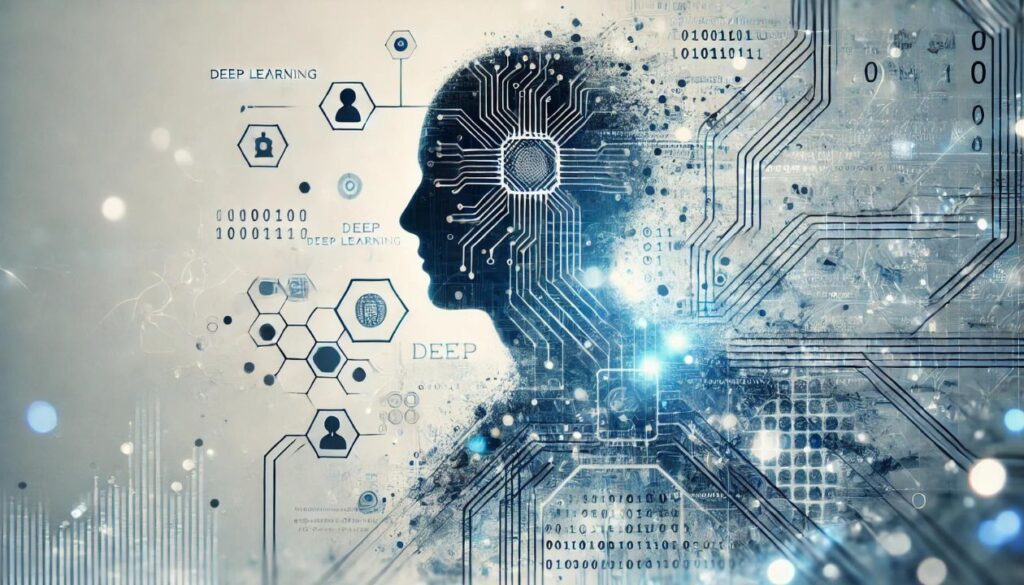Deep learning, a breakthrough subdivision of artificial intelligence, is becoming an integral part of our lives through its application in countless everyday technologies.
Some examples of its applications include virtual personal assistants – Siri, Alexa, and facial recognition. It improves healthcare by automating diagnoses and entertainment by recommending films and music on Netflix and Spotify.
Indeed, with the further development of deep learning, its practical applications are slow but constantly becoming fundamental to enhancing the convenience, effectiveness, and utility of products and services provided to customers.

What Is Deep Learning?
“Like peeling back the layers of an onion, deep learning reveals the hidden truths within data.“
It is a branch of machine learning modelled after the human brain's neural cells to analyze and sort copious amounts of data. This takes machines to a level where they can learn new experiences, be in a position to understand a pattern, and even decide exceptionally with very little or almost no input from the human part.
Popular technologies like voice recognition, facial recognition, self-driving cars, and recommendation engines rely heavily on deep learning.
For instance, deep learning models for analyzing data like images, audio, and text contain several layers of neural networks, thus providing a very high degree of accuracy in terms of results. Deep learning impacts various aspects of life, including healthcare, entertainment, and finance.
For example, enrolling in a deep learning course would provide background on neural networks, training of models, and their uses for anyone aiming to become an expert in deep learning. These courses teach learners how deep learning can be applied in some fields to enhance AI systems.
Top Deep Learning Applications
Here are the top applications of deep learning:
- Image Recognition: Some applications of deep learning include categorizing images that can be used in medicine, such as identifying tumours on social media where pictures are automatically tagged.
- Natural Language Processing (NLP): It is used in translation, speaking, and understanding emotions, as well as in chat interfaces based on examples of Google's translator and Siri.
- Autonomous Vehicles: Deep learning algorithms help a self-driving car decide the next move to be made or identify an object in front of it through sensors and cameras.
- Voice Assistants: Existing virtual personal assistants, including Alexa, Google Assistant, Siri, and others, apply deep learning to distinguish the voice, interpret commands, and mimic human responses.
- Recommendation Systems: Deep learning is used by Netflix to recommend programs based on user preferences, and in the same way, Spotify also always recommends songs similar to songs or artists that the users have favored.
- Fraud Detection: In finance, deep learning helps one work out fraud cases by identifying the abnormality in financial data that deviates from the general trend.
Today, deep learning is used in many spheres and enriches people's lives.
Deep Learning Applications in Daily Life
Some of the applications of deep learning are evident in our daily lives and are used in most of the technologies we interact with daily.
Voice recognition software for assistants like Siri, Alexa, and Google Assistant all function on deep learning to recognize commands from human voice, understand natural language, and provide an appropriate response.
In social media, deep learning algorithms include image recognition for tagging and filtering images and content recommendations.
Companies such as Netflix and Spotify apply deep learning to assess the users' behaviour and offer recommendations regarding shows or songs, which enrich users' experiences. In healthcare, deep learning is used in medical diagnosis, analyzing images like X-rays and MRI scans to detect diseases.
Furthermore, for recommendation and targeted advertising, e-commerce platforms and apps also incorporate deep learning, in-home automation systems, thermostats, lighting, etc., and use deep learning based on the pattern of the users for efficient energy usage.
From a broader perspective, deep learning enhances aspects such as convenience, effectiveness, and customization in implementations within human lives, thereby making technology seamless and sensitive to user's needs.
Future of Deep Learning
Deep learning is expected to bring significant advancements in various sectors, such as healthcare, finance, automotive systems, and natural language processing.
Advances in deep learning will drive transformation in fields such as precision medicine, smart cities, and advanced automation. It has gained recognition, and the future use of deep learning in various sectors will provide jobs to professionals with AI skills.
Thus, persons who complete a deep learning certification course possess the required theoretical knowledge and practical experience that can help them succeed in this constantly growing field.
These courses include neural networks, model optimization, and real-world application, allowing learners to work on premier AI projects. AI is gradually ingraining itself into industrial processes, and any aspiring personnel seeking to establish themselves in AI professions will need a deep learning certification.
“Deep learning transforms data into insight and insight into innovation.”
Wrap Up:
It has become rather difficult to imagine today's world without deep learning as it is constantly used in many applications that make our lives easier, more efficient, and personalized.
Talking about Siri, Alexa, Netflix, and Spotify, as well as many other platforms, deep learning improves users' experiences by identifying their preferences and patterns. In healthcare, it helps diagnose patients, and in the case of self-driving automobiles and fraud detection, its efficiency in pattern recognition is highly useful.
With the increasing advancement in deep learning technology, its applicability to various fields will also increase, proving to be a crucial part of modern technological development that paves the way for great innovations and solutions to practical problems.







